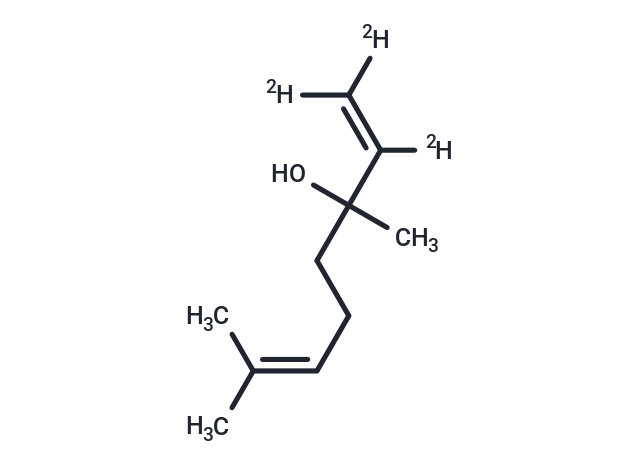- Remove All
 Your shopping cart is currently empty
Your shopping cart is currently empty
Linalool-d3
Linalool-d3 is a deuterated compound of Linalool. Linalool has a CAS number of 78-70-6. 1. Linalool, a natural compound of the essential oils, has been shown to have antinociceptive, antimicrobial, and anti-inflammatory properties. 2. Linalool was protected against LPS/GalN-induced liver injury through induction of antioxidant defense via Nrf2 activating and reduction inflammatory response via NF-κB inhibition. 3. Linalool biosynthesis and accumulation might be involved in plant defense against bacterial and fungal pathogens and be associated with field resistance to citrus canker. 4. Linalool significantly increased the expression of antioxidant enzymes regulated by Nrf-2 and diminished lung tissue levels of several pro-inflammatory cytokines, including tumor necrosis factor α (TNF-α) and interleukin (IL)-6.

Linalool-d3
| Pack Size | Price | Availability | Quantity |
|---|---|---|---|
| 1 mg | Inquiry | 35 days | |
| 5 mg | Inquiry | 35 days |
Product Introduction
| Description | Linalool-d3 is a deuterated compound of Linalool. Linalool has a CAS number of 78-70-6. 1. Linalool, a natural compound of the essential oils, has been shown to have antinociceptive, antimicrobial, and anti-inflammatory properties. 2. Linalool was protected against LPS/GalN-induced liver injury through induction of antioxidant defense via Nrf2 activating and reduction inflammatory response via NF-κB inhibition. 3. Linalool biosynthesis and accumulation might be involved in plant defense against bacterial and fungal pathogens and be associated with field resistance to citrus canker. 4. Linalool significantly increased the expression of antioxidant enzymes regulated by Nrf-2 and diminished lung tissue levels of several pro-inflammatory cytokines, including tumor necrosis factor α (TNF-α) and interleukin (IL)-6. |
| Molecular Weight | 157.27 |
| Formula | C10H15D3O |
| Cas No. | 1216673-02-7 |
| Storage | Shipping with blue ice. |
Calculator
In Vivo Formulation Calculator (Clear solution)
Dose Conversion
Tech Support

Copyright © 2015-2025 TargetMol Chemicals Inc. All Rights Reserved.




